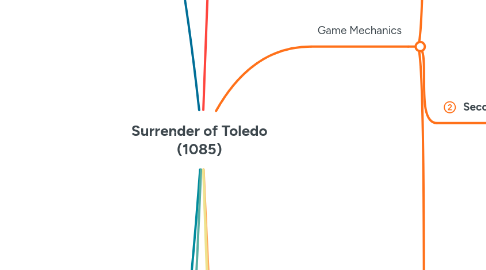
1. Characters and Factions
1.1. Kingdom of Léon
1.1.1. Inner Circle of King Alfonso VI
1.1.1.1. King Alfonso VI
1.1.1.1.1. Daughter Urraca
1.1.1.2. Queen Constance
1.1.1.3. *Maiordomo* Pelayo Vellídez
1.1.1.4. *Alferez* (Captain of the Guards) Rodrigo Ordóñez
1.1.1.5. Queen Urraca (sister of Alfonso)
1.1.2. Diplomats and Advisors
1.1.2.1. Juan Baldemírez (royal notary)
1.1.2.2. Alfonso Remírez (royal notary)
1.1.2.3. Sisnando Davídiz
1.1.2.4. Joseph Ha-Nasi Ferrizuel/Alfonso's physician
1.1.3. Nobles
1.1.3.1. Count Pedro Ansúrez
1.1.3.2. Count Martin Alfónsez
1.1.4. Church
1.1.4.1. Abbot Bernard of Sédirac
1.1.4.2. Bernard, Bishop of Palencia
1.1.4.3. Osmundo, Bishop of Astorga
1.1.4.4. Bishop Jimeno of Burgos
1.1.4.5. Pelayo Tedóniz, Bishop of Leon
1.2. Kingdom of Toledo
1.2.1. Mozarabic Community
1.2.2. Toledan Patricians and Muslim Community
1.2.3. Jewish Community
1.2.4. Court of al-Qadir
1.2.4.1. Al-Qadir
1.3. Less Distant Powers
1.3.1. Taifa kings?
1.3.1.1. Umar Al-Mutawakkil ibn al-Aftas (King of the Taifa of Badajoz)
1.3.1.2. Al-Mu'tamid ibn Abbad (Seville)
1.3.1.3. Al-Mutamin, one of two heirs of the king of Zaragoza
1.3.1.4. Al- Mutamin's brother Mundhir al-Hayib ruling over Lérida and Tortosa
1.3.2. Aquitainian Nobility
1.3.2.1. William I of Burgundy
1.3.2.2. Raymond of Burgundy (son of William)
1.3.3. Iberian Christian Nobles and Royals
1.3.3.1. Elvira (sister of Alfonso)
1.3.3.2. Garcia II (brother of Alfonso and imprisoned in Leon) †1090
1.3.3.3. Berenguer Ramon II, Count of Barcelona
1.3.3.4. Sancho Ramirez, King of Aragon
1.3.3.5. El Cid, Rodrigo Díaz de Vivar
1.4. Other
1.4.1. Distant Powers
1.4.1.1. Almoravids
1.4.1.1.1. Yusuf ibn Tashfin
1.4.1.2. Fatamid Vizierate
1.4.1.2.1. Badr al-Jamali
1.4.1.3. King of France
1.4.1.3.1. Philip I
1.4.1.4. Papacy
1.4.1.4.1. Cardinal Richard, papal legate
1.5. Indeterminates
1.5.1. **Matchmaker**
1.5.1.1. Bring People together
1.5.2. **Wrecker**
1.5.2.1. Try to break an easy agreement among factions
1.5.3. Every character should have a measure of indeterminacy
2. Schedule
2.1. Declaration of War and Strategy Vote
2.2. Negotiations
2.2.1. Multiple rounds of negotiation as things change
2.2.2. Alfonso's position becomes stronger the longer the city is besieged and no exterior aid arrives
2.3. End Game
2.3.1. Toledo falls
2.3.2. Toledo surrenders
2.3.3. Toledo resists
3. Scope
3.1. Goals
3.1.1. Pregame - setting the stage
3.1.1.1. Will Alfonso help al-Qadir put down rebellions
3.2. Tensions and Conflicts
3.2.1. Religious differences
3.2.1.1. Toledans are really anti-Leonese
3.2.1.2. Some Leonese (especially new French nobility and clergy) don't want anything to do with Muslims
3.2.2. Social class hostility
3.2.2.1. AlQadir has been promoting non-patricians as tax collectors and officials
3.2.3. Ethnic Differences
3.2.3.1. alQadir is Berber
3.2.4. Disatisfaction with taxation
3.2.4.1. Patricians and intellectuals leave Toledo after first revolt under alQadir. This makes taxation harder (i.e people aren't there anymore to tax).
3.2.4.2. Paying paria to Leonese angers Toledans
3.3. Possible Topics for debate in negotiations
3.3.1. Freedom of Religion
3.3.2. Maintenance of Rights/Freedoms
3.3.3. Maintenance of wealth/goods
3.3.4. Right to security/ life
4. Characters in a squarish bubble like this are the major actors.
5. Overview
5.1. Key People
5.2. Description
5.3. Background
6. Game Mechanics
6.1. **Primary Mechanic:** Voting on negotiations
6.1.1. Equal votes
6.1.2. Weighted votes
6.1.2.1. Faction votes
6.1.2.1.1. In Alfonso's court, there is only a single group vote
6.1.2.1.2. In Toledo, each community gets to vote to approve the final treaty (and thus allow or scuttle the surrender)
6.1.2.2. Influence
6.1.2.2.1. We seem to want weighted voting, where some characters have more power than others to influence the vote.
6.2. **Secondary Systems**
6.2.1. Honour/ Prestige
6.2.2. Warfare
6.2.2.1. Does warfare happen during the game or only in the Endgame?
6.2.2.2. To what extent is there a world outside the negotiations which we need to take into account?
6.2.2.2.1. Do we need a gameboard (real or virtual) to denote areas of control? Camps, fortresses, forces, supply lines? Do we want a war game component to the RPG?
6.2.3. Siege
6.2.3.1. At minimum we need some kind of mechanic for playing out if a frontal assault of Toledo succeeds. If there is no other wargame component (see above, "warfare") then this should remain relatively simple – something like dice rolls x military influence of attacker vs. defender.
6.2.3.1.1. The Fourth Crusade RTTP game and the Investiture Controversy RTTP game had models for this
6.2.4. Military Power
6.2.4.1. How is military power determined?
6.2.4.2. How does military power change?
6.2.4.2.1. Alfonso's bargaining position increases the longer the siege lasts
6.2.4.2.2. Al-Qadir drops the longer the siege lasts
6.2.5. Wealth
6.2.5.1. Gifts, donations, patronage favours
6.2.5.2. Favours
6.2.5.3. What can people do with wealth? Do characters need to have condition to fulfill - i.e. Architect needs money to build mosque, so can't achieve this victory condition without getting a donation from a patron?
6.2.6. Assassination/ Life Saving
6.2.6.1. How can players be killed?
6.2.6.1.1. Rules and limitations
6.2.6.2. How can players be healed?
6.2.6.3. If a player dies, who do they become next?
6.2.7. **Control of Information**
6.2.7.1. rumours
6.2.7.2. truth-telling
6.2.7.3. translation
6.2.7.3.1. How can we place limits on people of different language groups understanding one another?
6.2.7.4. communication
6.2.7.4.1. How can people communicate in game. In the classroom anyone can speak (assuming that translators are there)
6.2.7.4.2. Outside classroom, correspondence should be governed by rules. Only certain people can communicate with others
6.2.7.5. Proxy speach
6.2.7.5.1. Who can speak on someone else's bahalf?
6.2.7.6. Limiting Access
6.2.7.6.1. Can queens (e.g. Constance) limit access of people speaking to rulers? How do we create rules around this?
6.3. How to win
6.3.1. Is there such thing as a faction victory?
6.3.2. Or only individual victories?
